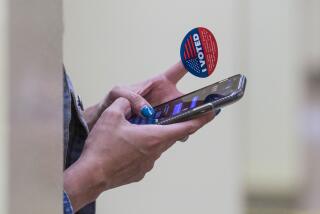The Electronic Republic: Reshaping Democracy in the Information Age.<i> By Lawrence K. Grossman (Penguin: $12.95, 290 pp.)</i>
“The irony is that while Americans feel increasingly powerless, cynical and frustrated about government, the distance between the governed and those who govern is actually shrinking dramatically. Many more citizens are gaining a greater voice in the making of public policy than at any time since the direct democracy of the ancient Greek city-states some 2,500 years ago. . . . Incessant public-opinion polling and increasingly sophisticated interactive telecommunications devices will make government instantly aware of, and responsive to, popular will--some say, too responsive for the good of the nation. . . . The people at large are taking on a more direct role in government than the Founders ever intended. . . . Most studies of government, politics, and the media start at the top by examining the qualities of leadership that define political life. The message of this book, however, is that in the coming era, the qualities of citizenship will be at least as important as those of political leadership.”
****
Democracy succeeds only so long as people feel it is within their power to control their destiny. The information revolution promises a new populist voice in governance. But at the same time, people know too well that they have barely any voice at all about the nature and extent of the information revolution itself. This is a paperback reprint of his well-received 1995 hardcover in which Grossman, former president of PBS and NBC news, makes keypad democracy seem not as bad as we might fear, and at the same time worse. This is clearheaded analysis of the changes already wrought by communications technology. And it provides some telling warnings about the world ahead, where there is no time and no geography and where citizens must be more diligent than ever.
More to Read
Sign up for our Book Club newsletter
Get the latest news, events and more from the Los Angeles Times Book Club, and help us get L.A. reading and talking.
You may occasionally receive promotional content from the Los Angeles Times.







